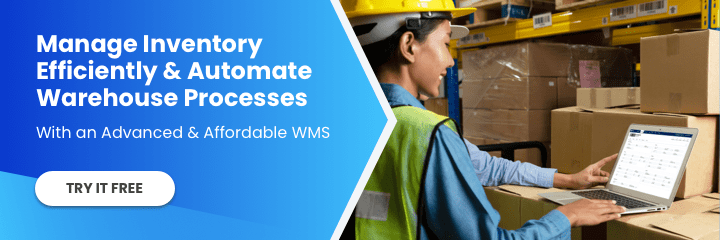Managing a warehouse has always been challenging. You must tackle several problems simultaneously to ensure smooth operations. If warehouse problems are not tackled, the efficiency and productivity of warehouse operations are greatly affected. This results in increased errors, order delays, inaccurate inventory, poor customer service, etc.
Click Here: Solve Your Warehouse Problems With This Advanced & Affordable WMS
This article will cover four common warehouse problems and how to solve them. Read the rest of the article to learn more.
4 Common Warehouse Problems and How to Solve Them
1. Human Error
It is normal for humans to make mistakes. However, too many mistakes can negatively impact your warehouse efficiency, causing damages, injuries, significant delays, and poor customer service.
For example, the manual process of measuring parcels with a tape measure, calculating weight, taking photos, and uploading the data into a system is error-prone. Any error in this process may cause issues, such as a parcel exceeding a storage rack’s weight limit, not fitting in the assigned space, having incorrect information in your WMS, etc. Other errors due to manual operations include picking the wrong products, picking the incorrect quantity, or damaging products due to mishandling.
Solution
Investing in the right warehouse automation technologies can help you overcome this problem and increase warehouse accuracy and efficiency. Automated solutions can also help minimize human touches, drastically reducing the number of human errors.
For example, an automated parcel dimensioner allows warehouses to automatically and accurately measure parcels’ dimensions (length, width, and height), calculate weight, and capture images. They also automatically upload the data in the WMS, reducing errors from data entry.
Automated guided vehicles (AGVs) are another technology that can reduce errors. It can safely move cargo around different types of warehouses with minimal human assistance, improving efficiency and reducing costs associated with human error.
2. High Labor Costs
High labor costs are another warehouse problem. Labor is one of the most significant warehouse expenses, taking up around 60% of the total warehouse budget.
Solution
There are two effective solutions to expensive labor-related warehouse problems. The first is maximizing the use of the available labor force. You can achieve this by measuring their productivity, implementing a regular feedback mechanism, investing in proper training, and recognizing them for their hard work.
The second is assisting labor with technologies that automate repetitive and tedious manual tasks. There’s a common misconception that investing in automation is expensive. However, warehouse managers must understand that inefficient labor doesn’t come cheap either. Automation technologies such as pallet dimensioners, automatic guided vehicles, autonomous mobile robots, etc., are a one-time investment with low maintenance. On the other hand, you need to pay for your labor daily/monthly, making it a recurring expense.

3. Label Issues
Label issues are another warehouse problem that can reduce warehouse efficiency. Warehouses are robust facilities that require equally robust barcode label solutions. Standard labels are not strong enough to withstand frequent cleaning and general wear and tear, making them unreadable. This delays operations and affects warehouse efficiency. Common label issues that may result in errors are scratched printheads, leftover adhesive ooze, missed compliance codes, peeling edges, misplaced barcodes, and color issues.
Solution
Not all labels are made up of the same material. Therefore, choosing the right label material must be based on the warehouse application. For example, polyester material labels are suitable for low-level storage racks. Retro-reflective labels are good for upper storage racks with hanging signs. Durable metal labels are ideal for labeling on the floor.
Additionally, choose temperature-resistant labels to withstand the harsh cold storage conditions. You should select labels for outdoor storage that can survive rain, wind, humidity, and frequent temperature fluctuations. Your labels should be easily visible, easy to read, and durable for heavy traffic areas. Also, choosing a good contrast between the background color and the text of your labels makes them easy to read.
Effectively used warehouse labels can help you streamline your operations and increase productivity. Making the label system sequential would be best because it allows employees to locate specific items in the warehouse efficiently.
4. Outdated Warehouse Layout
You designed a sleek and strategic layout when you first established your warehouse. However, due to increased goods traffic, your layout is now working against you and needs an update. Inefficient use of available spaces is a common problem in warehouses with a poor layout, negatively impacting profits.
Solution
To overcome this warehouse problem, you should periodically re-slot the facility and re-evaluate the design of your layout to accommodate your business model. Consider these principles of warehouse layout design to create an optimized layout. A well-executed and optimized warehouse layout design provides easy access to stored goods, streamlines operations, and reduces travel time and expenses. It helps you improve order fulfillment rates, storage utilization, productivity, and customer satisfaction.

Conclusion
While warehouse problems can feel overwhelming, the above solutions can help you resolve them. As you may have noticed, it is apparent that technology solutions play a crucial role in solving warehouse problems and helping you improve efficiency and reduce costs. Now that you have understood how to improve a warehouse, it is time to implement the suggested solutions in the article.
If you are ready to resolve warehouse problems, use our Solutions Finder tool.
For more information about warehouse technologies and optimizing other warehouse processes, follow us on LinkedIn, YouTube, X, or Facebook. If you have other inquiries or suggestions, please contact us here. We’ll be happy to hear from you.












